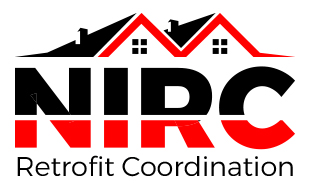Transform your home into a more sustainable, efficient, and cost-effective space.
Start your journey toward smarter energy use today!
What is Retrofit Coordination?
Retrofit coordination is the key to successful energy efficiency upgrades for buildings. Acting as the central hub for all activities, a retrofit coordinator ensures your project is planned, executed, and completed to the highest standards—delivering cost savings, comfort improvements, and environmental benefits.
Why is Retrofit Coordination Important?
Whether you’re upgrading a single property or managing a large-scale housing project, retrofit coordination ensures:
- Comprehensive Planning: Every detail of your project is tailored to your building’s needs and energy goals.
- Seamless Execution: From design to installation, everything runs smoothly and stays on track.
- Guaranteed Results: Quality assurance and performance checks ensure energy savings are achieved.


What Does a Retrofit Coordinator Do?
- Building Assessments: Analyzing
energy performance and identifying improvement opportunities. - Tailored Action Plans: Creating
a step-by-step roadmap for effective retrofitting. - Stakeholder Collaboration: Managing contractors, engineers, and building occupants for seamless
communication. - Regulatory Compliance: Ensuring
adherence to energy standards and safety regulations. - Quality Assurance: Overseeing
installation and verifying results post-completion.
Who Needs Retrofit Coordination?
- Homeowners: Looking to lower energy bills and improve comfort.
- Property Developers: Upgrading buildings for higher energy performance ratings.
- Landlords & Housing Associations: Meeting regulatory requirements and sustainability targets.
- Businesses: Companies retrofitting their offices or facilities to meet sustainability goals or reduce operational costs.
- Developers and Builders:For new builds or major renovations requiring compliance with energy standards.
- Fuel-Poor Households: Those eligible for schemes like ECO4 or Great British Insulation Scheme, needing guidance on funding and installations.

With retrofit coordination, you can transform your home into a more sustainable, efficient, and cost-effective space. Start your journey toward smarter energy use today!
Key reasons installers need retrofit coordination under PAS 2035
Installers need retrofit coordination to comply with PAS 2035, which is the UK standard for managing energy-efficient retrofit projects. PAS 2035 ensures that retrofit projects are carried out systematically, safely, and effectively, with a focus on improving energy efficiency while minimizing risks like damp or poor ventilation.
What Retrofit Coordination requires?
The Energy Company Obligation (ECO) is a government mandate requiring energy suppliers to fund energy efficiency improvements in homes. Launched in 2013, ECO focuses on helping vulnerable households, low-income families, and those in fuel poverty. The scheme typically supports:
- Compliance: It’s mandatory for projects funded under schemes like ECO4 or the Great British Insulation Scheme.
- Quality Assurance: Ensures high standards in planning, installation, and post-installation monitoring.
- Risk Management: Identifies and mitigates risks associated with retrofitting, such as thermal bridging or condensation.
- Holistic Approach: Guarantees that all measures work together to optimize energy efficiency and comfort.
- Customer Satisfaction: Provides a clear framework to meet customer expectations and regulatory requirements


What is GBIS Funding?
The Great British Insulation Scheme (GBIS) is a more recent initiative designed to complement ECO, focusing primarily on insulation upgrades for a broader range of households. It aims to reach middle-income homes that may not qualify for ECO but still face energy inefficiencies.
Key Features:
- Primary Focus: Insulation measures such as loft insulation, cavity wall insulation, and external wall insulation.
- Eligibility: Includes both low-income households and some middle-income households, based on specific criteria.
- Objectives: Address energy wastage across a larger portion of the UK housing stock while helping households lower their energy costs.
How Do They Work Together?
- ECO:
Provides targeted assistance for the most vulnerable households.
- GBIS: Broadens access to insulation funding for middle-income families, filling gaps where ECO may not apply.
Benefits of ECO and GBIS Funding:
- Lower Energy Bills: Insulation and efficiency improvements significantly reduce heating costs.
- Improved Comfort: Better-insulated homes maintain warmth in winter and coolness in summer.
- Reduced Carbon Footprint: Cutting energy waste helps the UK achieve its net-zero targets.
Both schemes are vital for making UK homes more energy-efficient and resilient to rising energy costs. If you’re a homeowner or tenant, exploring your eligibility for these funding opportunities can lead to significant savings and a more sustainable living environment.
